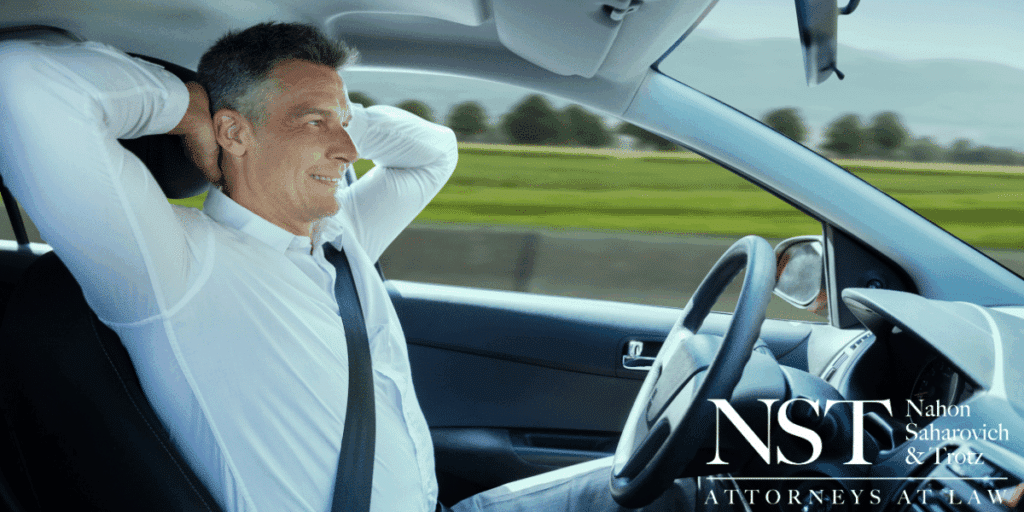- Liability in self-driving car accidents may extend to the rideshare company, manufacturer, or other third parties.
- Passengers have the same right to compensation as they would have in a traditional car accident.
- Rideshare companies like Uber, Lyft, and Waymo have high-limit insurance policies that are active when passengers are in the car.
- Identifying fault in a self-driving car accident can be more complex, but a skilled lawyer can help.
- It’s important when you’re in a self-driving rideshare accident to gather as much evidence as possible, including photos of the scene.
If you have been injured in an Uber or Lyft self-driving car accident, you have the same rights as any other accident victim.
Not knowing what to do in this kind of accident is understandable, given that companies have only recently begun working with autonomous vehicle (AV) providers.
NST Law is committed to fighting for justice for our clients by helping passengers and drivers understand liability in a variety of scenarios. Introducing autonomous cars into the mix adds some complexity, but the legal consequences still depend on who is responsible—a driver, passenger, pedestrian, or a third party.
Who Can Be Held Liable in an Uber, Lyft, or Waymo Self-Driving Accident?
Rideshare and robotaxi accidents often involve shared liability, which means multiple parties have some responsibility. The introduction of fully autonomous vehicles, like those operated by Waymo, adds another layer of complexity. These vehicles are currently being tested and deployed in cities like Nashville, making it crucial to understand who may be responsible when an accident occurs. Just like Uber and Lyft, companies like Waymo must ensure that their technology is safe, tested, and appropriately monitored. If a Waymo autonomous taxi causes or contributes to a crash, liability could rest with the company, the vehicle manufacturer, the tech developer, or other third parties, depending on the cause of the accident.
Furthermore, insurance companies getting involved may add additional complexity because of layered liability, which means one policy activates after another covers what it can.
Lyft, Waymo, and Uber accident lawyers have the experience and skill to navigate these systems. If you are a rider or driver, it helps to know who can be responsible in a rideshare self-driving crash.
The Rideshare Company
Companies like Uber, Lyft, and Waymo are legally responsible for providing a safe driving and riding environment. For Uber and Lyft, this includes vetting their AV partners and ensuring their technology is reliable. For Waymo, which operates its own self-driving fleet, it means maintaining and deploying technology that meets rigorous safety standards.
If an AV on the Uber or Lyft platform is involved in an accident, liability should work as in any other crash. For instance, if the vehicle is carrying a passenger or on its way to a ride, company insurance and liability apply.
If a Waymo vehicle is involved in a crash, the company’s insurance and policies will be key in determining liability and compensation eligibility—especially if the vehicle was actively transporting a passenger or was en route to pick one up.
The Vehicle Manufacturer
Like traditional automakers, AV manufacturers are responsible for keeping their vehicles free of safety defects. If an AV’s design or mechanical components contribute to a crash, the company may be liable for injuries or property damage.
In some cases, these are the same product liability claims that any auto manufacturer might face. Maybe the airbag deploys incorrectly and causes an injury or the roof collapses in a rollover and crushes the occupant. In other cases, the defect relates directly to the self-driving system.
The Tech Company
Self-driving cars use artificial intelligence, or AI, to maneuver busy roadways and steer clear of obstacles. AI systems use real-time data from integrated sensors to behave like a human driver.
But if those sensors or their underlying systems fail and cause an accident, the company that developed them may be liable. Investigating the design process and learning if there was negligence in coding, testing, or implementation is important.
Negligent Third Parties
Autonomous vehicle designers, manufacturers, as well as host platforms are not automatically at fault for accidents. Drivers of non-automated vehicles may also share or hold full responsibility if they acted negligently or recklessly. The same may be true for a pedestrian who stepped carelessly into the road or a municipality that failed to fix a known road hazard.
The Passenger
Although it’s rare for a passenger to contribute to the accident, it can happen. A curious rider in a self-driving car might tamper with its controls or act in a way that distracts other drivers.
As car accident lawyers, we pursue every possible avenue to identify all responsible parties.
What if You're a Passenger in a Self-Driving Uber or Lyft, or Waymo?
If you’re a passenger in a rideshare autonomous vehicle accident, you have the same right to compensation as any other rider. If you weren’t at fault, you can claim damages for your accident-related losses.
Uber and Lyft carry $1 million in liability coverage for those injured in accidents where the car was carrying a passenger.
Waymo operates self-driving taxis, which places the company legally responsible when accidents occur while transporting passengers. Because Waymo operates without human drivers, liability analysis may depend more heavily on the vehicle’s internal systems, programming, or potential software defects.
Additionally, most passengers can claim compensation through this coverage for accident-related losses, such as pain and suffering, lost wages, and medical bills. If the rideshare company was not responsible for your accident or other parties shared significant fault, you may need to file one or more third-party lawsuits. Consider meeting with an attorney as soon as possible to discuss your options.
What if You're Another Driver or Pedestrian Hit by a Self-Driving Rideshare Car?
If you were on foot and injured by a self-driving car, your next steps would be different from those in a traditional crash involving traditional vehicles. Instead of proving that another driver was at fault, you need to show that the vehicle was responsible. From there, insurance companies and attorneys can pursue the specific at-fault parties.
It helps to have as much evidence as possible. Video recorded by dashcams, surveillance footage, and other documentation of the accident can help. Preserve any files you have and organize them for easy access
How Insurance Works in Self-Driving Rideshare Accidents
Multiple potentially liable parties can mean the interplay among insurance coverage might become complicated. Here are some of the policies that might be involved.
Uber and Lyft's Insurance Coverage
Uber and Lyft carry liability insurance covering passengers and others injured in accidents where the driver is at fault. There are three basic coverage scenarios:
- The app is off: The rideshare driver’s personal auto insurance is the only coverage available.
- The app is on and the driver is available: Both Uber and Lyft offer contingent liability coverage, which may apply if the driver’s personal insurance does not. This includes up to $50,000 per person, $100,000 per accident for bodily injury, and $25,000 for property damage.
- The driver is en route to or carrying a passenger: Uber and Lyft provide up to $1 million in third-party liability coverage, which typically covers injuries and property damage caused to others.
App-off and available-driver rules are unlikely to apply in an autonomous vehicle situation unless the car is on the road for another reason. In that case, Uber or Lyft may still be liable for any damage the accident causes. Company insurance is likely to apply if the car is en route or picking up a passenger unless the fault lies with another party.
The Insurance of the Autonomous Vehicle Technology Provider or Manufacturer
Liability insurance is widely available for auto manufacturers and technology companies, so it stands to reason that AV companies and their vendors would have relevant policies.
Given the terms of traditional auto manufacturer liability coverage, it’s likely that these policies would cover injuries and damage if the accident involves a product defect.
Waymo, as the owner and operator of its self-driving fleet, carries its own insurance coverage that may apply when its autonomous taxis are involved in accidents—especially when the vehicle is actively carrying or picking up passengers.
The Passenger's Insurance
If a rideshare passenger has personal injury protection, or PIP, as part of their car insurance policy, it may provide coverage after a rideshare accident. PIP covers medical payments, lost wages, and property damage coverage for the policyholder and passengers. The passenger’s health insurance may also cover injuries, depending on other insurance circumstances.
Navigating Multiple Insurance Claims
With so many insurance policies in play, it takes an experienced legal professional to sort out liability. A skilled Lyft and Uber robotaxi accident lawyer can consider your case and help you pursue compensation.
Unique Challenges in Self-Driving Rideshare Accident Claims
There are two significant challenges after an AV accident: determining the cause and identifying the responsible party. If the autonomous vehicle’s AI system made a negligent decision, like turning left into traffic, it might not be immediately obvious what caused that action. Adjusters and attorneys need to investigate the algorithm’s development and execution to find where the error occurred.
Another challenge is the evolving legal landscape of autonomous vehicle liability. Without a comprehensive federal law, some states have developed their own legislation. Some have decided that the owner of the vehicle can be held responsible for an AV not following traffic laws. Others don’t specify liability when a human driver isn’t present. Owners, drivers, adjusters, and attorneys must be familiar with the laws in their respective states.
What To Do Immediately After a Lyft Self-Driving Accident
If you’re a passenger or a driver in another car, protect your rights after an accident by taking the following steps:
- Seek medical attention: Even if your injuries seem minor, get checked out. Some injuries don’t cause symptoms immediately, and medical records are key evidence in claims.
- Document the scene: Take photos and videos of the accident, including the self-driving interface if possible.
- Collect contact information: Gather the names, emails, and phone numbers from everyone involved, including any witnesses.
- Avoid speaking to insurers: Anything you say could be used to shift blame or minimize your claim. Do not provide a recorded statement without first consulting an attorney.
- Connect with an attorney: Look for a lawyer who understands AV accident law and can fight for your rights.
The Importance of Legal Representation in a Self-Driving Rideshare or Robotaxi Accident
Our experienced personal injury lawyers can help passengers injured in self-driving Uber, Lyft, and Waymo accidents in Tennessee, Arkansas, Mississippi, and Missouri. We have experience with personal injury cases, rideshare accidents, and product liability law, as well as state-specific knowledge of developing AV regulations. We can:
- Investigate the accident and source evidence, including technical data
- Identify all liable parties, such as software developers and AV manufacturers
- Communicate and negotiate with insurance companies
- Protect your right to fair compensation, even in complicated liability scenarios
Our attorneys are adept at handling complex multi-defendant cases involving corporate entities. If you have an Uber or Lyft AV crash injury claim, we can protect your right to fair compensation for medical expenses, lost wages, and pain and suffering.
Let Our Car Accident Lawyers Review Your Case for Free
NST Law has the skill, experience, and knowledge to handle complex rideshare accidents. We’ve recovered billions for clients and have over 35 years of experience fighting for victims of all types of crashes.
Injured in a self-driving Uber or Lyft? Call NST Law at 800-529-4004 or contact us online to schedule a free consultation today.
 Skip to content
Skip to content


